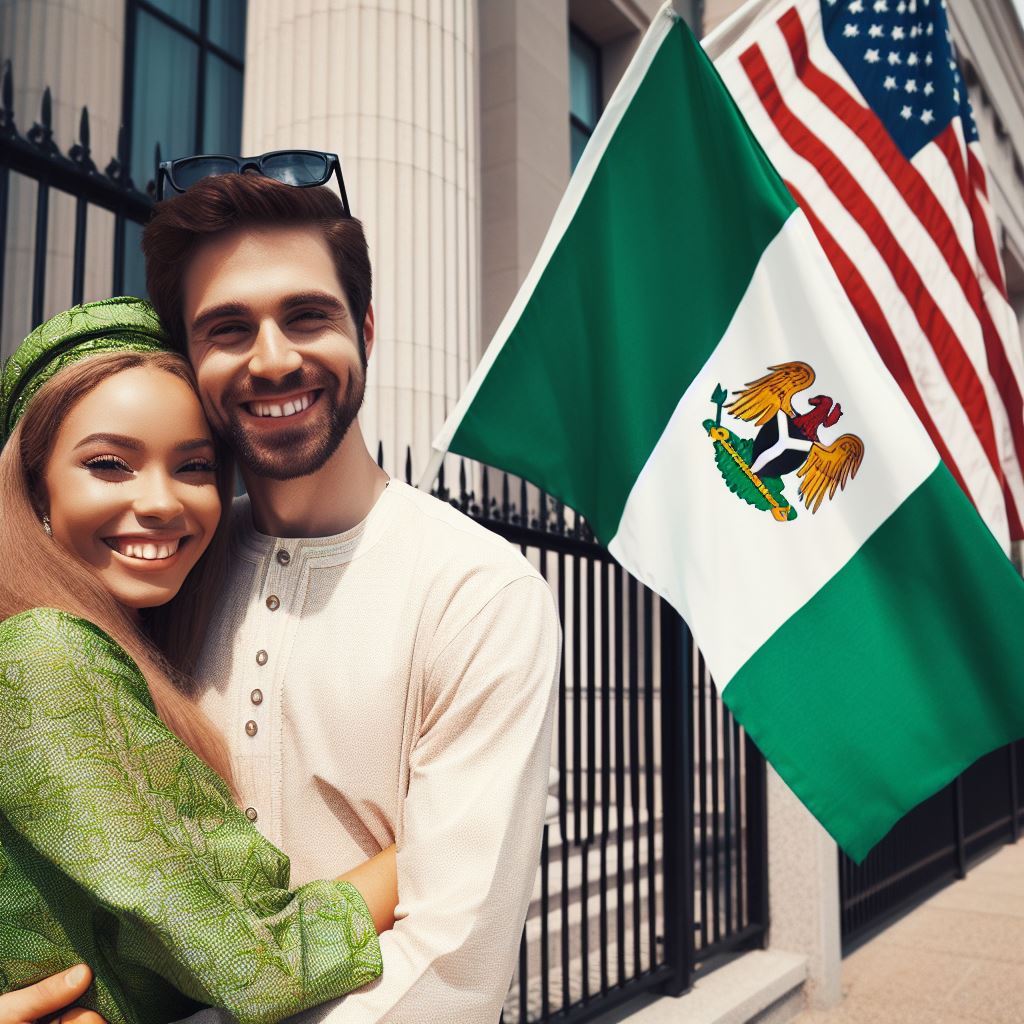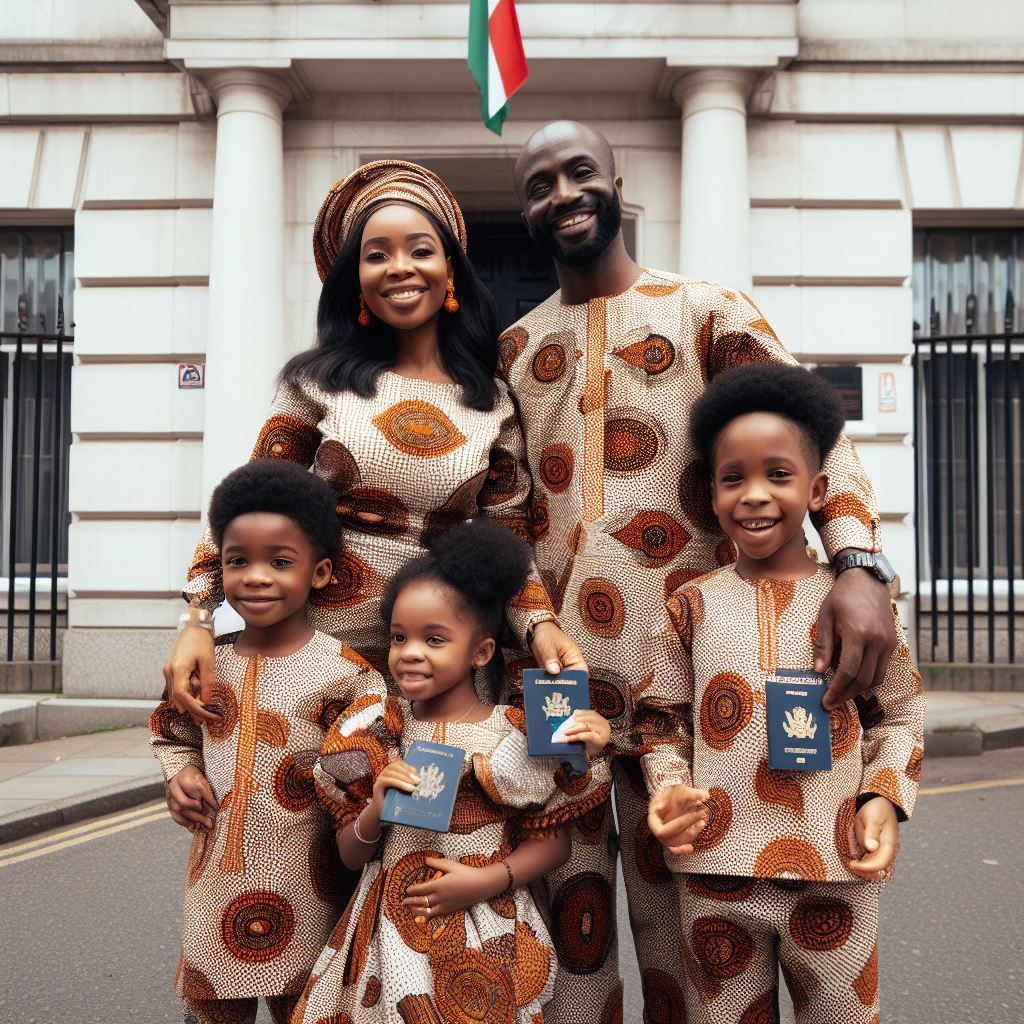Introduction
Let’s explore financial implications of marriage-based citizenship in Nigeria.
Marriage-based citizenship is the process in which individuals obtain citizenship through marriage.
In Nigeria, this concept has notable financial implications for both the individuals and the country as a whole.
When a foreign national marries a Nigerian citizen, they may be eligible to apply for Nigerian citizenship.
However, this process often involves various financial commitments.
For instance, the couple may need to hire legal representation to ensure a smooth immigration process, which can be costly.
Additionally, there are financial obligations related to obtaining the necessary documents and meeting the requirements set by the Nigerian Immigration Service.
These expenses can include fees for marriage certificates, visas, and other immigration-related paperwork.
Furthermore, obtaining Nigerian citizenship through marriage may also impact the couple’s financial situation.
For example, the foreign spouse may be required to renounce their original citizenship, which can have implications for their employment or business opportunities abroad.
Moreover, once Nigerian citizenship is acquired, the couple will be subject to Nigerian tax laws and financial regulations.
This can result in changes to their financial planning and potentially affect their assets and investment strategies.
Overall, the financial implications of marriage-based citizenship in Nigeria extend beyond the initial costs of the immigration process.
It involves ongoing financial considerations for the couple and impacts their overall financial stability.
In subsequent sections, we will delve further into the specific financial impacts for individuals and the broader economic implications of marriage-based citizenship in Nigeria.
Importance of Marriage-Based Citizenship in Nigeria
Marriage-based citizenship is a significant process for Nigerian citizens seeking to broaden their horizons and improve their lives.
It offers numerous advantages and benefits that contribute to their overall well-being and quality of life.
Why Nigerian citizens seek marriage-based citizenship
One key reason why Nigerian citizens seek marriage-based citizenship is the access to rights it provides.
By obtaining citizenship through marriage, Nigerians can enjoy a range of privileges and protections, including the right to vote, own property, and access legal services.
This expanded set of rights empowers them and enhances their participation in their host country.
Additionally, marriage-based citizenship offers valuable spousal support.
Nigerian citizens who marry foreign individuals gain the support of their spouses, both emotionally and financially.
This support can be crucial in adapting to a new environment, especially in terms of language barriers and cultural differences.
It fosters a sense of unity and partnership within the marriage.
Furthermore, marriage-based citizenship allows for family unification.
It ensures that Nigerian citizens can live together with their spouses and establish a family unit.
This unity is essential for emotional and psychological well-being, as it provides a stable and nurturing environment for children.
Security and stability are other notable benefits of acquiring citizenship through marriage.
Nigerians who obtain citizenship through marriage gain a sense of security, as they are legally recognized as a resident or citizen of the foreign country.
This recognition offers protection against deportation and provides a more secure future for themselves and their families.
Marriage-based citizenship opens doors to better employment opportunities for Nigerian citizens.
With citizenship in a foreign country, they can access a wider range of job prospects, higher wages, and improved working conditions.
This enhances their economic situation and helps in providing for their families.
The benefits and advantages of acquiring citizenship through marriage
Aside from the individual advantages, acquiring citizenship through marriage provides broader benefits for Nigerian citizens.
Freedom of movement is a crucial advantage, allowing Nigerians to travel and reside freely in their spouse’s country.
It enables them to explore new cultures, study, and work abroad without facing the hassle of visa restrictions.
Social integration is another advantage of marriage-based citizenship.
By becoming citizens through marriage, Nigerians can better integrate into the foreign society, building relationships and participating in cultural activities.
This integration fosters a sense of belonging and reduces feelings of isolation or exclusion.
Healthcare access is also improved for Nigerian citizens with marriage-based citizenship.
They gain access to better healthcare services, including affordable or free medical care, preventive measures, and improved quality of treatment.
This contributes to their overall well-being and quality of life.
Furthermore, marriage-based citizenship opens doors to better educational opportunities for Nigerian citizens.
They can pursue higher education in their spouse’s country, benefitting from educational systems that offer advanced courses, research opportunities, and scholarships.
This widens their knowledge and enhances their career prospects.
Acquiring citizenship through marriage enables Nigerian citizens to receive social security benefits.
They become eligible for various support programs, including unemployment benefits, disability allowances, and retirement pensions.
These benefits provide a safety net and ensure a more stable future for Nigerian citizens.
In esence, marriage-based citizenship is of great importance to Nigerian citizens.
It offers a multitude of benefits, including access to rights, spousal support, family unification, security, employment opportunities, freedom of movement, social integration, healthcare access, educational opportunities, and social security benefits.
These advantages contribute to the well-being and overall prosperity of Nigerian citizens, enabling them to build better lives for themselves and their families.
Read: Understanding the Revocation of Citizenship in Nigeria
Financial Considerations for Nigerian Citizens Marrying Foreigners
Marrying a foreigner as a Nigerian citizen entails various financial considerations that individuals should carefully assess before making this commitment.
Highlight the costs associated with the marriage process
The marriage process involves a range of expenses that can have a significant impact on a couple’s finances.
- Expenses related to the wedding ceremony: Planning a wedding can be a costly affair, including venue rental, catering, decorations, and entertainment.
- Legal and documentation fees: Obtaining the necessary marriage licenses and certificates may require payment of various fees, both to local authorities and legal professionals.
- Travel and transportation costs: If the foreign spouse resides outside Nigeria, there may be expenses associated with travel to their home country for the wedding or facilitating their relocation to Nigeria.
It is crucial for couples to budget and plan for these costs to avoid unexpected financial strain.
The financial support requirements for sponsoring a foreign spouse
When a Nigerian citizen chooses to sponsor their foreign spouse for citizenship, they must meet specific financial support requirements:
- Income and financial stability requirements: The sponsoring spouse should demonstrate sufficient income or assets to support the foreign spouse without relying on public assistance.
- Financial obligations during the immigration process: The sponsoring spouse may be responsible for covering various costs related to the immigration process, such as visa application fees, medical examinations, and travel expenses.
- Potential risks and challenges: Sponsoring a foreign spouse can have financial risks, including the need to provide ongoing financial support if the foreign spouse is unable to find employment in Nigeria.
It is essential to consider these requirements and potential challenges carefully before proceeding with the sponsorship process.
Marriage-based citizenship can bring immense joy and fulfillment, but it is vital to be prepared for the financial implications involved.
By thoroughly understanding the costs associated with the marriage process and the financial support requirements for sponsoring a foreign spouse, Nigerian citizens can make informed decisions that align with their financial capabilities and goals.
Read: The Role of Legal Counsel in Nigerian Marriage Citizenship

Economic Implications of Marriage-Based Citizenship
Marriage-based citizenship has significant economic implications for Nigeria.
By granting citizenship to foreigners who marry Nigerians, the country may experience various benefits and challenges.
The possible economic benefits for the Nigerian economy
- Increased foreign direct investment: Marriage-based citizenship can attract more foreign investors who wish to establish businesses or invest in existing Nigerian enterprises. These investors may be motivated by the desire to gain Nigerian citizenship for themselves and their families, leading to increased capital inflows.
- Job creation opportunities: The marriage-based citizenship policy can contribute to job creation in Nigeria. Foreign spouses who obtain citizenship may start businesses or seek employment, generating new employment opportunities for both Nigerians and other foreigners residing in the country.
- Expansion of international businesses: When foreign spouses become Nigerian citizens, they can establish or expand international businesses within the country. This can lead to the transfer of knowledge, technology, and innovative business practices, promoting economic growth and enhancing Nigeria’s position in the global market.
The potential drawbacks and challenges for the Nigerian economy
- Brain drain and loss of skilled professionals: Marriage-based citizenship may result in a brain drain as skilled Nigerian professionals choose to marry foreigners and settle abroad. This can lead to a loss of valuable human capital, making it challenging for Nigeria to retain and develop its skilled workforce.
- Competition for limited resources: Granting citizenship to foreign spouses can intensify competition for limited resources in Nigeria. As the population increases, there may be a strain on infrastructure, healthcare, education, and other public services.
The government will need to manage resources efficiently to meet the needs of both citizens and foreign spouses. - Social and cultural integration challenges: The integration of foreign spouses and their families into Nigerian society can pose social and cultural challenges. Language barriers, differences in values and traditions, and potential conflicts may arise, requiring efforts to foster understanding, acceptance, and harmony among diverse communities.
In fact, marriage-based citizenship in Nigeria has both economic benefits and challenges.
It can attract foreign investment, create job opportunities, and expand international businesses.
However, it also carries the risk of brain drain, competition for limited resources, and social integration challenges.
Careful consideration and effective policies are necessary to maximize the economic benefits while mitigating the potential drawbacks for the Nigerian economy.
Read: Embracing Love’s Journey: Hausa Marriage Anniversary Blessings
Social Implications of Marriage-Based Citizenship
Marriage between individuals of different nationalities not only has financial implications but also significant social ramifications.
These social implications arise from the distinct social dynamics that are present within mixed-nationality marriages.
The social dynamics within mixed-nationality marriages
Cross-cultural communication and understanding is a crucial aspect of a successful mixed-nationality marriage.
Partners must navigate language barriers, differences in communication styles, and varying cultural norms.
This requires open-mindedness, patience, and a willingness to learn and adapt.
Another social dynamic within mixed-nationality marriages involves navigating different customs and traditions.
Each partner brings their own set of cultural practices, and it is essential to find a balance between them.
This may include celebrating both partners’ cultural festivals or adopting a fusion of customs that resonate with both individuals.
Societal perceptions and stereotypes also play a role in marriage-based citizenship.
Some societies may hold stereotypes or biases towards individuals marrying for citizenship purposes.
This can create prejudices and challenges for couples who may face judgment or scrutiny from the public.
Overcoming these societal perceptions requires strength, resilience, and educating others about the authenticity of their relationship.
The impact on family and community relationships
Moving on to the impact on family and community relationships, mixed-nationality marriages can affect support systems and integration.
Support from both families is crucial for the success of the marriage.
However, cultural differences and language barriers can pose challenges to building relationships with in-laws and extended family members.
It is essential to foster understanding and create a supportive environment for intercultural interactions.
Maintaining connections with the home country and relatives can also be significant for individuals in a marriage-based citizenship situation.
It is essential to find ways to bridge the gap between the partner’s home country and the new country.
This may include visits, maintaining regular communication, and keeping cultural traditions alive within the household.
Cultural adaptation and identity are other domains that are impacted by marriage-based citizenship.
Individuals may experience a sense of displacement, as they navigate between their heritage and the new cultural environment.
Balancing multiple identities can be challenging but essential for maintaining a sense of self and cultural roots.
In general, the social implications of marriage-based citizenship in Nigeria extend beyond the financial aspect.
In mixed-nationality marriages, cross-cultural communication, understanding, and addressing stereotypes are crucial.
Additionally, maintaining relationships with both families, integrating into the community, and preserving cultural identity play significant roles in these social dynamics.
Understanding and navigating these implications are essential for a harmonious and successful marriage-based citizenship experience.
Read: Strengthening Marital Bonds: Yoruba & Igbo Anniversary Prayers
Conclusion
In this blog post, we have discussed the financial implications of marriage-based citizenship in Nigeria.
It is evident that obtaining citizenship through marriage in Nigeria can have both positive and negative financial consequences.
On the positive side, it offers access to various financial benefits and opportunities, such as employment and property ownership.
However, there are also financial risks involved, including potential fraud and financial dependence on the Nigerian spouse.
It is essential for individuals considering marriage-based citizenship to carefully evaluate the financial implications and make informed decisions.
It is advisable to seek legal and financial advice to understand the potential costs and obligations associated with this process.
Maintaining open and honest communication with your spouse about financial matters is crucial for a successful marriage-based citizenship.
While marriage-based citizenship in Nigeria can bring financial advantages, it requires careful consideration and planning to mitigate potential risks.
Therefore, individuals should weigh the financial advantages and disadvantages before embarking on this path.
The decision to pursue marriage-based citizenship should be based on a thorough understanding of the financial implications and the commitment required.
By being well-informed and proactive, individuals can ensure a smoother financial journey in their pursuit of marriage-based citizenship in Nigeria.
It is imperative to approach marriage-based citizenship in Nigeria with caution and foresight to minimize any adverse financial consequences.




